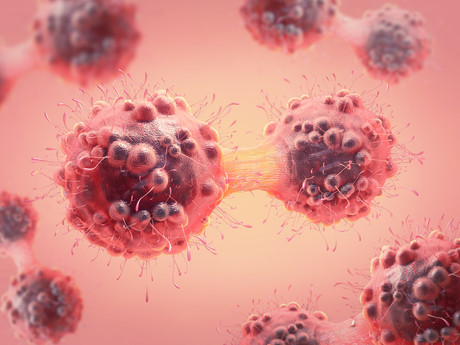Designer molecule targets cancer growth protein

A new molecule designed by University of Adelaide researchers has successfully targeted a protein that plays a major role in the growth of most cancers. This protein target is called proliferating cell nuclear antigen (PCNA), otherwise known as the human sliding clamp.
“PCNA is required for DNA replication and is therefore essential for rapidly dividing cancer cells,” said project leader Dr John Bruning, from the University of Adelaide’s Institute for Photonics and Advanced Sensing (IPAS).
“PCNA holds the machinery that copies DNA. The DNA slides through the centre of this donut-shaped protein where it is replicated.
“If we can inhibit the action of this protein, the cells can’t make DNA, so they can’t divide. This is really tackling cancer at ground zero. It’s stopping cell division and therefore tackling cancer at its most fundamental level.
“We also know that PCNA is ‘overexpressed’ — or makes too many copies — in 90% of all cancers. That means it is a potential target for inhibiting the growth of multiple cancers, not just a select few.
“And importantly, this protein seldom mutates, which means that it is less likely to develop resistance against a drug inhibitor.”
Working in collaboration with the University of Wollongong, the team at IPAS designed a molecule that can interact with PCNA, offering a promising new strategy for the design of a PCNA-inhibiting anticancer treatment. Their research has been published in Chemistry: A European Journal.
“In this study, we have taken a protein fragment that naturally interacts with PCNA and transformed it using smart chemistry into a drug-like molecule,” said lead author Dr Kate Wegener, from the University of Adelaide’s School of Biological Sciences.
“We’ve changed its chemistry to protect it from degrading like the natural protein, and so that it works better.”
The new molecule shows increased potency over other PCNA inhibitors, the researchers said, and is likely to result in fewer side effects. Dr Bruning explained, “Because of the special approach we have used in turning a natural protein into a drug-like molecule, it fixes to PCNA more readily and its action is specific to this protein.
“This is a first. It’s the first in this type of inhibitor and it will pave the way for a new class of drugs inhibiting the proliferation of cancerous cells.”
Neurosensing/neurostimulation implants session to be held on Monday
On Monday, a session at UNSW Sydney will include people who are benefiting from bioelectronics...
argenx and Monash University partner against autoimmune diseases
To advance a pioneering molecule for autoimmune diseases, global immunology company argenx has...
Archer completes potassium sensing alpha prototype
Quantum technology company Archer Materials Limited has developed an early Biochip prototype...



